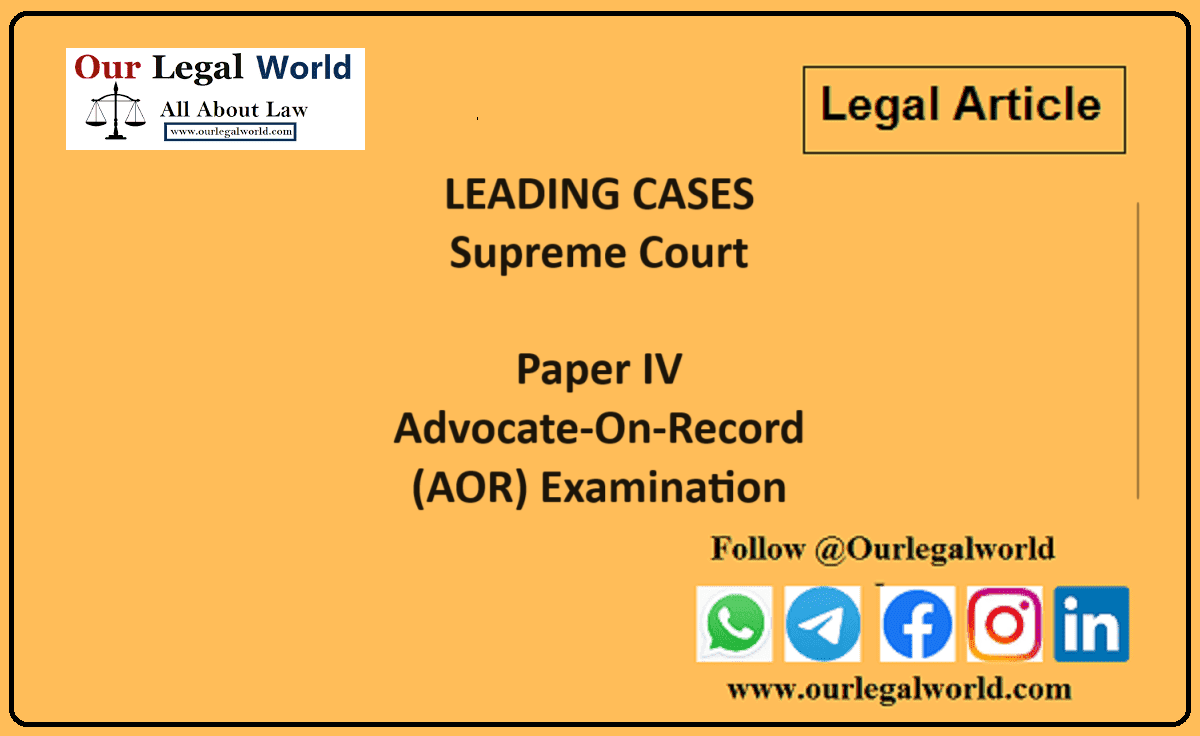Quo Warranto : Latin Maxim- Our Legal World
Introduction
Quo-warranto is the name of the writ by which an action is commenced for recovering of an office of franchise from the person or authority possessing the same without valid title to the office and/or usurping the same. It is the remedy which is applied by the Court to inquire the validity in legal terms, of the contention which a party states to an office and to leave him from its possession if the contention is to have been declared forfeited.[i]
Information in the nature of quo warranto is the modern form of the ancient writ of quo warranto which lay against a person, who claimed or seized an office, to examine by what authority she supported her assertion which in consequently determines the right to the office.[ii]
Meaning of the Maxim
According to the Black’s Law Dictionary,[iii]
The Latin Maxim, Quo warranto, literally means ‘by what warrant? or authority?
- A common-law writ used to examine the authority of a public office held.
- An action by which the court may revoke a corporation’s position.
Constitutional Provisions
According to our Constitution, the Supreme Court and the High Courts have power to issue writs in the nature of abeas corpus, mandamus, certiorari, prohibition and quo warranto, under Articles 32 and 226 respectively.
The object behind investing these power within the Supreme Court and High Courts, for the remedy against the infringement of fundamental rights in the big country like India, was to ensure the effective remedy for an aggrieved citizen or person.
Also Read: Pendente Lite Nihil Innovetur- Legal Maxim
Article 32, authorizes the Supreme Court to use the power to grant remedies for enforcement of the fundamental rights, conferred by the Part III of the Constitution. Section(2) of the Article reads as,
“(2)The Supreme Court shall have power to issue directions or orders or writs, including writs in the nature of habeas corpus, mandamus, prohibition , quo warranto and certiorari, whichever may be appropriate, for the enforcement of any of the rights conferred by this Part.”
Article 226, empowers High Courts to issue certain writs, not only for the remedy against breach of Fundamental Rights, conferred by Part III, but also for any other purpose. We may put this as High Courts power to issue writs for remedies are wider than that of the Supreme Court’s. The Section (1) of the Article reads as,
“(1)Notwithstanding anything in article 32, every High Court shall have power, throughout the territories in relation to which it exercises jurisdiction, to issue to any person or authority, including in appropriate cases, any Government, within those territories directions, orders or writs, including writs in the nature of habeas corpus, mandamus, prohibition, quo warranto and certiorari, or any of them, for the enforcement of any of the rights conferred by Part III and for any other purpose.”
Explanation of the Maxim
According to Justice B P Banerjee,[iv] the procedure of quo-warranto confers jurisdiction and authority on the Court to control executive action in the matter of making an appointment to public office against relevant statutory provisions.
It leads to protect the public from seizure of public office; in some cases persons who is not eligible to the public office may be allowed to engage them and continue to occupy them as a result of collusion of executive. In this case jurisdiction of the Court to issue writ of quo-warranto is rightly invoked, who has seized the office can be ousted and eligible person to the post can be allowed replace.
WHO MAY APPLY
A writ of quo-warranto may be applied at the instance of any person even a stranger, who has no personal or special interest. This is an exception to the general rule of locus standi applicable in case of Mandamus, Certiorari and/or Prohibition, where before a person can apply for a writ it has to be established that her legal right has been breached or she was prejudicially harmed by an act or omission of the authority.[v]
THE OFFICE MUST BE OF PUBLIC NATURE
The writ is granted only in respect of office which is public in nature. The office must be independently entitled and not held by one discharging the functions at the will and pleasure of others. To warrant a Court in entering an information in the nature of quo-warranto a case must be presented in which public have some interest.
There are three tests which can be applied to determine whether information will lie, A) source of the office, B) its tenure and C) its duty. Source of the office should be from the sovereign authority, by legislative enactment, it should have the fixed tenure and that too permanent and nature of its duty should be of a public.[vi]
ALTERNATIVE REMEDY
Proceeding in quo warranto will not be entertained when writ of mandamus affords appropriate and fitting remedy. When under the constitution of a statute, power to determine the election, the returns and qualifications of members of legislature is vested exclusively in each house as to its own members, the Courts cannot entertain their jurisdiction in quo warranto to determine the position of a member of the legislative body. In such a case, constitution having expressly lodged the power of determining such question in another body, the court cannot assume jurisdiction in quo warranto but will leave the question to the Tribunal fixed by the Constitution.[vii]
BURDEN OF PROOF
According to the general rule the burden of proof is on the respondent. When the Court calls upon the respondent to prove her title to the office she must show the continued existence of all qualifications necessary to its enjoyment. She must set out the claim specifically and prove it on the face of the answer that she has a valid claim. Hence the entire burden of proof is on the respondent.
DISCRETION OF THE COURT
Quo warranto is not a writ of right. The Court has a discretion to grant or refuse to grant it according to the facts and circumstances of each case.[viii]
The Court would inquire into the conducts and motives of the applicant.[ix]
The Court might in its discretion decline to grant quo-warranto —
(a)Where it would be vexatious to do so[x].
(b)Where the application would be futile in its results.[xi]
(c)Where there was an alternative remedy which was equally appropriate and effective.[xii]
Conclusion
We can conclude that it is a writ calling upon one to show by what warrant he holds or claims a franchise or office. It is a remedy to protect the rights of the individual against the misuse of the public office.
References
- [i] Justice B P Banerjee : Writ Remedies- Remediable Rights under public Law
- [ii] P Ramanatha Aiyar Advanced Law Lexicon
- [iii] the Black’s Law Dictionary, (11th ed. 2019)
- [iv] Justice B P Banerjee : Writ Remedies- Remediable Rights under public law.
- [v] Ibid.
- https://www.legalservicesindia.com/article/1885/Constitutional-philosophy-of-Writs:-A-detailed-analysis.html
- [vi] University of Mysore v. Govind Rao , AIR 1965 SC 491
- [vii] Justice B P Banerjee : Writ Remedies- Remediable Rights under public law.
- [viii] T.K. Kothandaram Dr. v. Secretary to the Shah Commission, New Delhi, MLJ : YD 1978 Suppl C 579 : (1978) 2 An WR 269.
- https://indiankanoon.org/docfragment/1938195/?formInput=article%2032
- [ix] Everett v. Griffiths, (1924) 1 KB 941.
- [x] R. v. Ward , (1873) LR 8 QB 210 at 213.
- https://indiankanoon.org/docfragment/1171702/?big=2&formInput=article%2032
- [xi] R. v. Fox , (1858) 8E & B 939; Ex parte Richards, (1878) 3 QBD 368; R. v. Speyer, (1916) 2 KB 858.
- [xii] R. v. Grosvernor , (1733) Kel W 280; Bradley v. Sylvester, (1871) 25 LT 459 at 460.
Edited by- Ankita Roy








![Tax Law Internship at Legum Attorney [Chamber of Ashish Panday], Delhi : Apply by 15th May 2025](https://www.ourlegalworld.com/wp-content/uploads/2025/05/IMG_0113-min.png)
